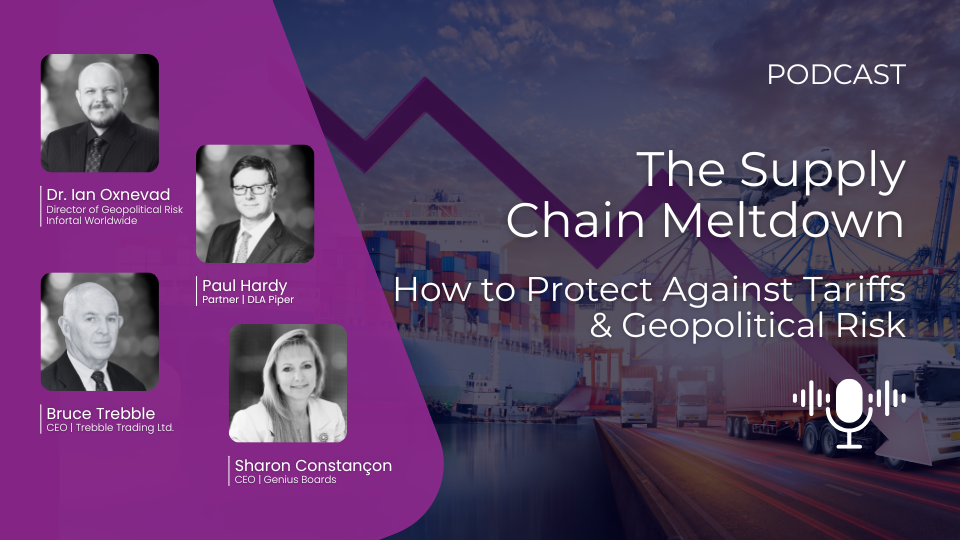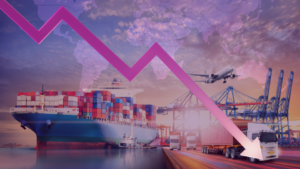Podcast
The Supply Chain Meltdown - How to Protect Against Forex, Tariffs and Geopolitical Risk
In this episode, Sharon Constançon is joined by experts Dr. Ian Oxnevad, Paul Hardy, and Bruce Trebble to explore the escalating risks facing global supply chains in 2025. The panel unpacks the impact of geopolitical tensions, aggressive tariff policies, and shifting trade alliances on cross-border operations, regulatory compliance, and financial stability.
The discussion dives into how businesses can respond to real-time trade policy changes, legal limitations in challenging tariffs, and the growing role of digitisation in building resilient supply chains. The panel also highlights the often-overlooked currency risks that arise from sudden market shifts and evolving trade routes, offering practical strategies for managing foreign exchange exposure in uncertain conditions.
Tune in to discover how proactive planning, digital transformation, and integrated risk strategies can help businesses protect their supply chains, strengthen treasury practices, and stay competitive in a fragmented global landscape.
Key Takeaways
In a world where trade policy can shift overnight, supply chain resilience has become a strategic imperative. This webinar offered practical insights into navigating the real-world impact of tariffs, geopolitical disruption, and currency volatility. From legal considerations to digitisation and treasury risk management, the discussion unpacked how businesses can build flexibility into their global operations and respond with confidence.
Key takeaways include:
- Geopolitical Risk Is Now a Strategic Variable: The global order is shifting rapidly, with rising tensions and regional power plays reshaping trade routes and market stability. Businesses can no longer rely on historical norms—political risk must be embedded into strategic planning.
- Tariff Disruption Requires Proactive Response: Trade policies are becoming more unpredictable, with tariffs used as tools of political leverage. Companies must assume these measures will be enforced and adjust operations, pricing, and contracts accordingly.
- Digitisation Drives Agility and Resilience: Technology-led supply chains can adapt faster to disruption. Real-time data, AI modelling, and integrated platforms reduce costs, improve transparency, and enable informed decision-making at speed.
- Currency Risk Demands Precision, Not Guesswork:
Foreign exchange exposure runs through every layer of international trade. Businesses need clearly defined hedging strategies that balance protection with flexibility to preserve margin and cash flow. - Legal Recourse Is Limited—Strategy Isn’t:
With multilateral mechanisms like the WTO weakened, businesses must lean on practical legal strategies—such as lobbying, supplier diversification, and contract restructuring—to mitigate risk at the ground level. - Urgency Is a Competitive Advantage: The pace of change leaves little room for hesitation. Scenario planning, cross-functional risk ownership, and executive-level engagement are essential to staying ahead of emerging threats.
These takeaways provide finance leaders, risk professionals, and global operators with a focused lens to address today’s most pressing supply chain and treasury challenges—equipping them to act decisively in a volatile world.
Introduction and Panel Overview
- Sharon Constançon opens the session, acknowledging the timing challenges across global time zones.
- She introduces herself as CEO of Valufin, a foreign exchange management firm.
- The expert panel includes:
- Dr Ian Oxnevad – Director of Political Risk at Infortal Worldwide, specialising in geopolitical intelligence.
- Paul Hardy – Partner at DLA Piper with expertise in global trade and legal policy.
- Bruce Trebble – CEO and supply chain digitisation expert, focused on tech-driven solutions for global trade.
Geopolitical Risks and Market Challenges
- Sharon outlines the current volatility affecting international trade, from legal pressures to technological disruption.
- Ian compares today’s geopolitical climate to historical periods of upheaval, warning that the old global order is breaking down.
- He highlights the impact of tariffs, inflation, AI, and energy tensions on business operations.
- Emphasises the need for companies to appoint a political risk lead and build flexibility into their strategic planning.
Legal and Policy Considerations
- Paul explains the legal backdrop to the current wave of tariffs, including the “America First” trade policy and its global repercussions.
- Notes recent tariff hikes on Chinese imports and retaliatory measures from Canada and Mexico.
- Advises businesses to treat these as real and imminent risks.
- Recommends practical responses such as:
- Contract and pricing reviews
- Lobbying efforts
- Supply chain diversification
- Trade credit insurance as part of broader risk mitigation
Digitising the Supply Chain
- Bruce outlines how digital transformation enhances transparency, agility, and cost efficiency.
- Shares a case study from the fresh produce sector showing how AI helps optimise market timing and decision-making.
- Stresses the importance of data integration to respond to shifting tariffs and supply disruptions.
- Encourages adoption of digital systems to future-proof operations.
Managing Currency and Financial Risk
- Sharon addresses the importance of hedging amid volatile currency markets.
- Discusses the challenges of foreign exchange exposure and the need for clear, adaptive policies.
- Advocates for balanced hedging strategies that allow financial agility without overcommitting.
- Recommends that companies work closely with experts to develop tailored FX risk frameworks.
Final Recommendations
- Bruce reiterates the need for digital adoption as a foundation for resilience.
- Ian urges businesses to recognise this period as a structural shift—not a temporary disruption—and to look for new opportunities within the emerging order.
- Paul underlines the value of rapid, informed decision-making and board-level risk awareness.
Featured Article
The rules of global trade have changed, and many businesses haven’t caught up.
Geopolitical events now ripple through financial systems in hours. FX exposure can erode margins before treasury teams even detect the risk. And importers and exporters are being asked to deliver agility and control — with less room for error than ever before.
Explore how smarter FX strategy, digitisation, and policy-aware planning can help global businesses protect margin and build financial resilience.
Host
Sharon Constançon is a trailblazer in the world of forex treasury management, bringing over 40 years of expertise to businesses navigating complex global markets. As South Africa’s first female Chief Forex Dealer, Sharon led innovative solutions and laid the foundation for what has become a vibrant Forex services market in the region. In 2009, she founded Valufin, a global leader in tailored treasury services, empowering companies to manage forex risks confidently and optimise their financial outcomes.
Throughout her career, Sharon has worked with over 200 international companies, helping them address the pitfalls in forex processes, implement effective accounting systems, manage transaction risks, and develop insightful management information. Her strategic approach ensures businesses are equipped to handle currency volatility and achieve financial stability.
A forward-thinker with a deep understanding of technology, Sharon has developed two SaaS platforms: FRM, the cornerstone of Valufin’s treasury services, and Hawk, which delivers advanced intelligent assessments. These innovations exemplify her commitment to driving efficiency and effectiveness in forex treasury management.
Sharon’s career began in the mining sector with a company now part of the Anglo-American Group before transitioning to forex management roles at Blue Circle and Société Générale in Johannesburg. In 1988, she founded Constançon Currencies, a pioneering forex services firm, before shifting her focus to governance and launching businesses in both South Africa and the UK.
In addition to her work in forex, Sharon is a respected voice in governance and boardroom dynamics. She lectures, conducts training, and speaks at global conferences, sharing her expertise on effective board practices and strategic risk management. Sharon’s ability to bridge the worlds of forex and governance makes her a sought-after leader, mentor, and educator in her field.
Guest Speakers
As the Director of Geopolitical Risk at Infortal Worldwide, Dr. Ian Oxnevad leads the firm’s Geopolitical Risk Intelligence & Analysis efforts. Ian’s Geopolitical Risk (GPR) thought leadership informs Infortal Worldwide’s GPR training program, due diligence investigations, and geopolitical risk advisory services.
Dr. Oxnevad is a political scientist and political economist by training, where he combined economics with security studies to examine issues of geopolitical risk, economic warfare, intelligence, terrorism, corporate espionage, and money laundering.
Ian leverages his expertise to advise and train clients on geopolitical and economic risks facing their operations. Ian’s expertise substantively expands Infortal Worldwide’s “boots on the ground” approach to obtain accurate and timely information on geopolitical threats and liabilities. Ian also advises clients on integrating risk intelligence into their operational and strategic planning processes.
Prior to joining Infortal Worldwide, Dr. Oxnevad taught courses on corruption and terrorist financing for the Association of Certified Anti-Money Laundering Specialists (ACAMS) and at other leading academic institutions. Ian has also routinely consulted with attorneys as an expert witness on cases related to terrorism, persecution, and human rights abuses.
Ian is a prolific author of several articles and books including, a book on terrorist financing in the international banking system: Making a Killing: States, Banks, and Terrorism (Montreal: McGill-Queens University Press, 2021).
Ian holds a Ph.D. in political science from the University of California and holds a MA in National Security Studies along with degrees in Arabic and English.
Paul Hardy is a highly experienced lawyer and policy adviser with over 25 years of expertise in global trade regulations, government affairs, and legal risk management. As the UK Head of Government Affairs at DLA Piper, he provides strategic policy advice to businesses, public sector organisations, and governments, helping them navigate the complexities of international trade, regulatory frameworks, and cross-border compliance.
Previously serving as Senior EU Legal Adviser to the UK Houses of Parliament and working at the European Commission in Brussels, Paul has played a key role in shaping legal strategies around international trade policies. His deep understanding of global regulatory landscapes, economic agreements, and trade risks makes him uniquely positioned to offer valuable insights on legal and policy challenges affecting global supply chains.
Bruce Trebble is a seasoned expert in global trade, import-export management, and supply chain digitisation, with extensive experience in optimising the movement of goods across international markets. As the CEO of Trebble Trading Limited, he oversees global commodity trading, supply chain certification, and digital transformation initiatives, helping businesses enhance efficiency, transparency, and commercial value in international trade.
Bruce specialises in identifying commodity sources, connecting buyers with producers, and ensuring seamless cross-border trade operations. His work focuses on leveraging cutting-edge digitisation and certification technologies to drive efficiency, reduce costs, and increase visibility across supply chains. Through the latest e-commerce and trade automation platforms, he helps companies streamline operations and improve regulatory compliance in an increasingly complex global trade environment.
Discover how Valufin’s expertise can support your business
Contact your forex treasury advisor today.










